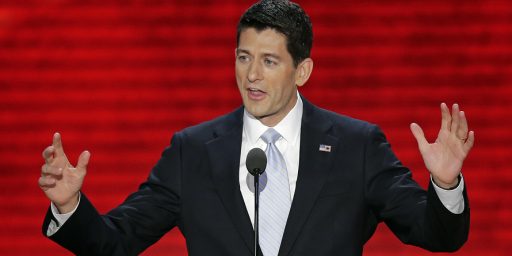Kyrsten Sinema Mixes Pleasure and Business
Running for office or just running?

I’m not quite sure what to make of the Daily Beast exposé “How Kyrsten Sinema Uses Campaign Cash for Her Marathon Habit.”
When Kyrsten Sinema ran the Boston Marathon last year, it was a proud moment the Arizona senator—an avid marathoner and triathlete—wanted to publicize.
“It’s been a long road to get here,” Sinema tweeted, along with photos of her running and celebrating the finish. “I kept running qualifying marathons, but the pandemic and then a broken foot had other plans for me. Couldn’t be more grateful to have 2 strong feet and 1 happy heart this Boston Marathon!”
Far less publicized, however, was another aspect to Sinema’s long-awaited journey to Boston: She appears to have turned it into a fundraising junket, allowing her campaign to cover the thousands of dollars in expenses she would have incurred herself by traveling to the race.
According to Federal Election Commission records, Sinema collected over $16,000 in campaign contributions from a handful of Massachusetts-based donors in April 2022—many of them at the maximum level, suggesting she held some type of fundraiser, if a small one.
There’s further evidence in filings from Sinema’s personal political action committee, Getting Stuff Done PAC, which spent over $1,500 on “meeting meals” and “event supplies” at Boston-area businesses the week of the race.
As it happens, in April 2022, Sinema’s campaign paid $8,470 in lodging expenses at an unspecified Ritz-Carlton Hotel. The photo Sinema posted to Twitter, however, showed herself and a friend posing in a hotel room with celebratory gift bags and certificates—which bore the luxe chain’s distinct lion logo.
I have never participated in the Boston Marathon and am exceedingly unlikely to do so at this stage, for reasons laid out by Sergeant Murtaugh. I don’t know why it would cost “thousands of dollars” to participate, though—although I would imagine the Ritz Carlton ain’t cheap on race weekend.
The Boston trip was far from the first time that Sinema has appeared to fuse a donor get-together onto a personal racing trip allowing her to write off travel costs.
On at least six total occasions since 2019, Sinema has participated in a race while engaging in fundraising activity—and covering expenses—in the area of the competition, according to a review of public campaign finance and competition records.
In May 2019, for instance, Sinema ran in the Mountains2Beach Marathon in Ventura County, California. In a two-week period around the race, Sinema raised some $21,000 from southern California-based PACs and donors, all giving hundreds or thousands of dollars; in the same time period, her campaign reported spending $400 to a Santa Barbara-based vendor for “lodging.”
In June 2021, Sinema participated in the Light at The End of the Tunnel Marathon outside Seattle. That same month, she raised over $18,000 from a small group of Washington state-based donors.
In October 2021, Sinema attended the Boston Marathon, but did not compete due to her broken foot. Still, her PAC reported spending nearly $1,500 on catering expenses to a Boston-based chain of high-end restaurants the same week, while her campaign spent over $5,200 to Black Tie Limo, a Boston-based transportation company. That month, Sinema raised some $36,000 from big-money Massachusetts donors.
That she routinely schedules fundraisers at race locales is surely not a coincidence. But she seems to be genuinely raising funds in so doing. Indeed, the 2021 Boston Marathon trip is telling: she didn’t participate in the race and raised “some $36,000.”
Now, certainly, it seems that she’s treating herself to a “Lifestyles of the Rich and Famous” level of poshness on these trips. Then again, I presume the limos and catering are primarily for the “big-money Massachusetts donors,” not herself and her entourage.
Here’s where it finally gets interesting:
Under FEC rules, candidates cannot use campaign funds to “fulfill any commitment, obligation, or expense of a person that would exist irrespective” of their running for or holding public office.
A spokesperson for Sinema did not respond to a detailed list of questions about her spending surrounding marathons and other athletic competitions.
According to campaign finance experts, Sinema may be following the letter of that rule, but is pushing into a gray area by appearing to tie legitimate campaign activity to unrelated personal pursuits.
“Tacking some personal activities on to a fundraising trip is generally going to be fine,” said Brendan Fischer, deputy executive director of the watchdog group Documented. “But this appears to be the inverse—tacking fundraisers on to personal trips to justify the use of campaign funds to cover the costs.”
I would concur in that assessment. But I have no idea how much of an outlier Sinema is in that regard and, again, she seems to be legitimately fundraising. If she were spending, say, $10,000 on the trip and raising, say, $500, I’d say the “fundraiser” was a ruse. But she seems to be raking in considerably more money than she’s spending.
That athletes typically train and plan for big races, like Boston, months or even years in advance makes it highly unlikely that Sinema’s fundraising activity was scheduled as the priority, said Fischer.
While I agree that the races are the primary scheduling driver, this argument is silly. Sinema is constantly training for and running marathons; it’s a lifestyle for her. She’s not spending “years” or even “months” training for a specific fundraiser. And, with the exception of huge races like Boston, I suspect it doesn’t require much advance planning to sign up for one—so it’s actually quite possible that she’s indeed tacking many of these races onto fundraisers rather than vice-versa.
“The FEC generally isn’t going to scrutinize this kind of spending,” he said. “But at the same time, I doubt any FEC commissioners would declare that a candidate may travel anywhere they want using donor funds, as long as they ask another donor for more money while there.”
Saurav Ghosh, an attorney with the nonpartisan Campaign Legal Center, agreed. “In a world where officeholders are really scrupulous about not only following rules to the letter but to the spirit, she wouldn’t be using campaign funds to pay for these things,” he said.
So, I actually agree with that. Certainly, the campaign shouldn’t be covering race expenses. But how does one disentangle them on a dual-purpose trip? Does the hotel room count as a campaign expense or a race expense? Ditto travel to and from? For that matter, one imagines she travels differently on personal and campaign business. Does she always stay at the Ritz-Carlton when traveling? Or only when schmoozing wealthy contributors?
Honestly, the more obvious concern isn’t the nickel-and-dime stuff but the system itself:
In a divided Senate, Sinema has leveraged her clout to secure wins for, among other moneyed interests, Wall Street and the crypto industry. Those two industries in particular have responded by pouring cash into her campaign and personal PAC. In the first three months of 2023, Sinema raised $2.1 million—much of it maximum contributions from individuals and PACs—giving her a $9 million campaign warchest heading into a potential 2024 showdown. (She has not yet officially announced her plans.)
Recently, Sinema’s questionably lavish campaign spending has drawn attention in outlets like the New York Post, which noted the eye-popping cash the oenophile senator has dropped on fine wines. In February, The Daily Beast reported on the unusually high amount that Sinema paid for security—and to a single contractor, her friend Tulsi Gabbard’s sister, Vrindivan Bellord.
Taken together, such data points demonstrate a troubling pattern to observers like Fischer.
“It is one thing to ask donors for money to support your campaign and get your message out to voters, it is another to ask them to bankroll your personal life,” he said. “If an officeholder is using donor dollars to subsidize their lifestyle or finance personal expenses, then campaign contributions pose a much greater risk of corruption.”
This is a forest-trees problem on a massive scale. The bankrolling of her personal life, to the extent she’s doing it, is small beer, indeed, compared to the influence and access these big money donors are buying. That’s surely way more important than whether she buys $15 bottles of wine or $150 bottles.
This, for example, is some serious prima donna stuff:
An internal guide to staffing Sinema, first reported by The Daily Beast last year, laid out in detail how much of her time was devoted to athletic pursuits—and how much her staff worked to square her regimen with the duties of public service. “These activities are very important to her and should be protected,” it reads.
Among other things, aides were expected to put her races on her calendar, ensure she had adequate rest time before race days, book recovery massages and physical therapy sessions for her during Senate workdays, and find hotels for her that had regulation-sized pools for lap swimming.
It’s impossible to exactly quantify how much campaign cash Sinema may have devoted to trips that included races, largely because candidates aren’t required to disclose much detail around airfare, hotel, and rental car expenses. At least $18,000 worth of expenses covered by Sinema’s campaign and personal PAC are easily tied to trips in which she also competed in a race.
Judging by Sinema’s astronomical outlays for travel in general, however, it’s likely the number is far higher.
Congressional staffers shouldn’t be doing this sort of work. (Or is it campaign staffers, paid out of campaign funds? Then, it’s merely obnoxious.) But, again, $18,000—or whatever the actual amount is—is chump change when she’s raising millions from monied interests as a Senate swing vote.
In a four-year span from 2019 to 2022, during which Sinema was not on any ballot, her campaign spent over $117,000 on airfare expenses. Compared to her colleagues, she’s a clear anomaly. Two fellow western state Democrats, also facing competitive elections in 2024, spent fractions of that amount in the same time period: Sen. Jon Tester (D-MT) spent $18,300, while Sen. Jacky Rosen (D-NV) spent $23,600.
The differences are just as stark when it comes to lodging expenses. In the same time period, Sinema spent over $105,000 on hotels, while Tester and Rosen each spent about $9,300. Notably, some of Sinema’s travel spending is earmarked as “security detail” expenses, bringing up her costs.
According to Ghosh, those discrepancies fuel a pattern of campaign spending by Sinema that he described as “maybe lawful, but certainly seems inappropriate.”
“Any time you see someone spend four, five, six times in a category from one of their comparables, it definitely raises a question of whether that’s a legitimate use of campaign funds—and certainly, even if it is legitimate, whether it is appropriate,” Ghosh said.
“That’s generally indicative of somebody who has figured out the system, knows where the cracks are, and is using this one to have the campaign finance a lot of things,” he added.
How do the travel expenditures compare to the funds raised, though? Sinema is a national figure in a way that Tester and Rosen aren’t. (Indeed, I’ve barely heard of Rosen, who came out of seemingly nowhere to win a House seat and then unseat Dean Heller for the Senate two years later.)
In terms of living a lavish lifestyle on the campaign trail, I’d really need comparison with other Senators to have a strong opinion on how usual it is. She certainly seems high maintenance. But she’s also nationally famous in a way few Senators are—for good and ill—and almost certainly has more pressing security concerns. (That she’s hired Tulsi Gabbard’s sister to handle security is a red flag but, hell, for all I know she runs a top-notch security firm.)
That she’s flying all around the country and raking in big bucks from moneyed interests that quite frequently don’t line up with those of her Arizona constituents strike me as the far bigger deal. That’s all perfectly legal under our system, alas. We’ve spent half a century—literally, going back to 1974 post-Watergate reform efforts—trying unsuccessfully to chase money out of the system. That doesn’t mean that it’s not potentially quite corrupting.






The Boston Ritz-Carlton starts at ~$600/night plus fees, I expect race weekend was double that.
Yes, she is pushing the limits as to what is allowed as ‘fundraising’
It seems increasingly likely, we won’t have Sinema around after the 24 election.
Cant she just claim all of the people giving her money are friends? It seems to work if you are a SCOTUS judge.
Steve
James, I think you and the Supremes are conflating corruption and the corrupting process with outright criminality. Someone who says, “I will vote for A if you give me $B” is out and out a criminal. But corruption can be a lengthy process starting with very minor favors. Calling those minor favors corrupting isn’t a moral judgement on the favors themselves, but rather a recognition that it is an age-old technique used in recruiting otherwise moral people people into unethical (not simply illegal) acts. Corrupting someone usually has a number of milestones with each step capable of being explained as “essentially” like the previous one. At some stage, though, the corrupter has the person by the short hairs, and the relationship shifts. And that shift doesn’t necessarily result in blatant criminality where the relationship shifts to that “A in return for $B” mode. But that is the effect. The participants may still pretend that it is all still “friends and little favors”, but they know.
The reason we hold people to strict ethical standards is simply a recognition that the corrupters have much more skill and experience in what they do than a moral but inexperienced person does in drawing appropriate lines.
@MarkedMan: I see an even deeper issue (and this is how I view Crow and Thomas). The corrupter obtains so much access to the corrupted so as to get the corrupted to see the world the same way the corrupter sees it. He no longer needs to say “A in return for $B” because the corrupted has simply learned to prefer A from his exposure to the corrupter.
@Joe: And I’m even more cynical. I don’t think Crow corrupted Thomas at all. That Thomas shares Crow’s worldview is the starting point and explains why neither one believes anything improper has happened.
@just nutha:
Perhaps. But it is also the way corruption works. Corruption refers to the process, often slow, of the flesh of a fruit or an animal becoming every more putrid starting from the slightest of blemishes. Regardless of Thomas’ world view or whether or not he believes his decisions are justified, at this point is he even capable of having thoughts at odds with the desires of his benefactors? The point of corruption is that the individual doesn’t have to realize it has happened. When they do, finally, there is often nothing left worth saving.
@just nutha:
This is demonstrably not true: Thomas was as recently as 2005 a defender of Chevron Deference and even wrote the “Brand X” ruling. Note that was before he met Crow in Now suddenly after being showered with gifts by Crow, Thomas is suddenly hostile to it.
Thomas’s opinions are for sale.
I rather struggle to see how Ms Sinema’s habits here are a subject of any concern except in some kind of puritatanical hair-shirt kind of vision of politics. If her method works (relative to fund raising), then she benefits, if it doesn’t … well then she fails (even if she spent 6k USD to raise 6 USD, that would seem to be merely incompetent cupidity, excepting if said person knew they were doomed…).
@just nutha: This is near certain – and indeed their relationship is not really corruption as such as one rather doubts that Thomas sans Mr Crow would have made a single vote differently. The non-disclosures as prima facia violation of law rather than the actual facts are problematic.
Overall the US progressives rather have something of the intellectuals idealisation and abstraction disease, expecting human beings to act like intellectual abstractions. Like Soviet New Man goals, this tends to be an excercise in futility.
What is this? 3 donors? Unless we are talking about a family of 4, in which case…
Calling this a fundraising trip is a lie, and not a very good one. We need our laws to be written by non legislators. As long as they are writing them, the loopholes are guaranteed.
If Karma were real her entire campaign funds, investment portfolio, etc etc etc would disappear in a crypto scam.
This is piddly-ass shit compared to the constant insider trading and big grifts that Senators and Representatives are routinely engaging in. Ideally this wouldn’t happen, but meh, it’s the tiniest problem in American political corruption.
Restrict stock trading in Congress, limit “gifts” from “friends” throughout government.
I mean, sure, if Sinema did anything illegal, get the justice department to look at it, but generally, go after the big problems. Seems more scummy than illegal to me, but that’s why we have prosecutors, let them figure it out.
(I claim whataboutism is fine if it’s arguing priorities.)
@Gustopher:
Agree.
But we need to police and correct small corruption, too. Small leads to big leads to large leads to RICO corruption.
I’ve always disliked Sinema. She exhibits strong indicators of NPD. Her manner. I don’t care about the way she dresses but it annoys a lot of people.
The one thing I like about Sinema is that her manner of dress annoys people and she clearly does it on purpose and good on her. I don’t give a crap about that. Shake that stuck up old shit up. The House and Senate should introduce casual Fridays, imo.
How does she vote? That is way more important to me. And she votes like shit.